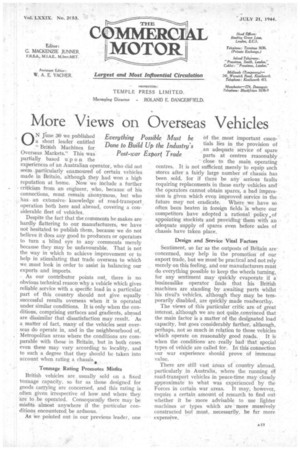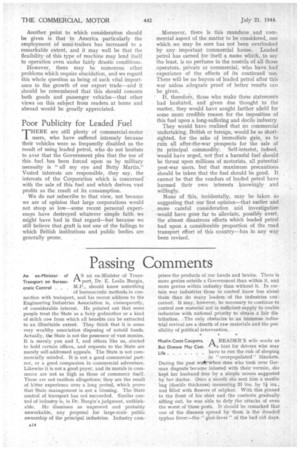More Views on Overseas Vehicles
Page 15

Page 16

If you've noticed an error in this article please click here to report it so we can fix it.
N Pine 30 we published a short leader entitled "• British Machines for Overseas Markets." This was partially based upon the experiences of an Australian operator, who did not seem particularly enamoured of certain vehicles made in Britain, although they had won a high reputation at home. Now we include a further criticism from an engineer, who, because of his connections, must remain anonymous, but who has , an extensive knowledge of road-transport. operation both here and abroad, covering a considerable fleet of vehicles.
Despite the fact that the .comments he makes are hardly flattering to our manufacturers, we have not hesitated to publish them, because we do not believe it does any good to producers or operators to turn a blind eye to any comments merely because they may be unfavourable. That is not the way in which to achieve improvement or to help in stimulating that trade overseas to which we must look in order to assist in balancing our exports and imports.
As our contributor points out, there is no obvious technical reason why a vehicle which gives reliable service with a specific load in a particular part of this country should not give equally successful results overseas when it is operated under similar conditions. It is only when the conditions, comprising surfaces and gradients, abroad are dissimilar that dissatisfaction may result. As a matter of fact, many of the vehicles sent overseas do operate in, and in the neighbourhood of, Metropolitan areas where the conditions are comparable with those in Britain, but in both cases even these may vary according to locality, and to such a degree that they should be taken into account when rating a chassis,.
Tonnage Rating Promotes Misfits British vehicles are usually, sold on a fixed tonnage capacity, so far as those designed for goods carrying are concerned, and this rating is often given irrespective of how and where they are to be operated. Consequently there may be misfits almost anywhere if the particular conditions encountered be arduous.
As we pointed out in our previous leader, one of the most important essentials lies in the provision of an adequate service of spare parts at centres reasonably close to the main operating centres. It is not sufficient merely to equip such stores after a fairly large number of chassis has been sold, for if there be any serious faults requiring replacements in these early vehicles and the operators cannot obtain spares, a bad impression is given which even improved service in the future may not eradicate. Where we have so often been beaten in foreign fields 'is where our competitors have adopted 'a rational policy of appointing stockists and providing them with an adequate supply of spares even before sales of chassis have taken place.
Design and Service Vital Factors Sentiment, so far as the outposts of Britain are concerned, may help in the promotion of our export trade, but we must' be practical and not rely merely on this feeling, and our manufacturers must do everything possible to keep the wheels turning, for any sentiment may quickly evaporate if a businesslike operator finds that his British machines are standing by awaiting parts whilst his rival's vehicles, although they may. be temporarily disabled, are quickly made roadworthy.
The views of this particular critic are of great interest, although we are not quite convinced that the main factor is a matter of the designated load capacity, but goes considerably farther, although, perhaps, not so much in relation to those vehicles which operate on reasonably good roads.. It is when the conditions are really bad that special types of vehicle are called for. In this connection our war experience should prove of immense value.
There are still vast areas of country abroad, particularly in Australia, where the running of road-transport vehicles in peace-time may closely approximate to what was experienced by the Forces in certain war areas. It may, however, require a certain amount of research to find out whether it be more advisable to use lighter machines or types which are more massively constructed but must, necessarily, be far more expensive. Another point to which consideration should be given is that in America particularly the employment of semi-trailers has increased to a remarkable extent, and it may well be that the flexibility of this type of machine may lend itself to operation even under fairly drastic conditions.
However, there may be numerous other problems which require elucidation, and we regard this whole question as being of such vital importance to the growth of our export trade—and it should be remembered that this should concern both goods and passenger vehicles—that other views on this subject from readers at home and abroad would be greatly appreciated.
Poor Publicity for Leaded Fuel
THERE are still plenty of commercial-motor 1 users, who have suffered intensely because their vehicles were so frequently disabled as the result of using leaded petrol, who do not hesitate to aver that the Government plea that the use of this_ fuel has been forced upon us by military necessity is " all my eye and Betty Martin." Vested interests are responsible, they say, the interests of the Corporation which is concerned with the sale of this fuel and which derives vast profits as the result of its consumption.
We do not subscribe to that view, not because we are of opinion that large corporations would not stoop so low—some recent personal experiences have destroyed whatever simple faith we might have had in that regard—but because we still believe that graft is not one of the failings to which British institutions and public bodies are generally prone. Moreover, there is this mundane and commercial aspect of the matter to be considered, one which we may be sure has not been overlooked by any important commercial house. Leaded petrol has earned for itself a name which, to say the least, is no perfume in the nostrils of all those operators, private or commercial, who have had experience of the effects of its continued use. There will be no buyers of leaded petrol after this war unless adequate proof of better results can be given.
If, therefore, those who make these statements had hesitated, and given due thought to the matter, they would have sought farther afield for some more credible reason for the imposition of this fuel upon a long-suffering and docile industry.
They would have realized that MD commercial undertaking, British or foreign, would be so shortsighted, for the sake of immediate gain, as to ruin all after-the-war prospects for the sale of its principal commodity. Self-interest, indeed, would have urged, not that a harmful fuel should be thrust upon millions of motorists, all potential post-war users, but that maximum precautions should be taken that the fuel should be good. It cannot be that the vendors of leaded petrol have harmed their own interests knowingly and willingly. None of this, incidentally, may be taken as suggesting that our first opinion—that earlier and more careful consideration and investigation .would have gone far to alleviate, possibly avert, the almost disastrous effects which leaded petrol had upon a considerable proportion of the road transport effort of this country—has in any way been revised.




















































